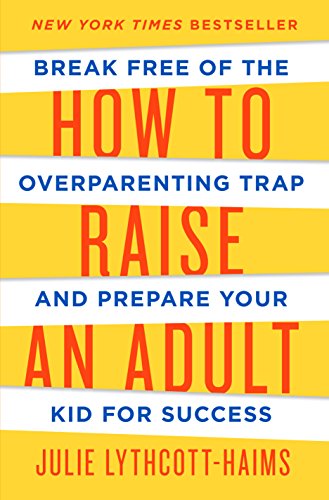How to Raise an Adult Summary

4 min read ⌚
 Break Free of the Overparenting Trap and Prepare Your Kid for Success
Break Free of the Overparenting Trap and Prepare Your Kid for Success
There’s parenting and then there’s overparenting. Unfortunately, the boundary between them is too narrow. In “How to Raise an Adult,” Julie Lythcott-Haims tries to differentiate between them, while keeping you on the safe side of the border.
About Julie Lythcott-Haims
 Julie Lythcott-Haims is an American author. She was Stanford University’s Dean of Freshmen and Undergraduate Advising and holds an MFA in writing from California College of the Arts. She has written one more book in addition to “How to Raise an Adult” – “Real American.”
Julie Lythcott-Haims is an American author. She was Stanford University’s Dean of Freshmen and Undergraduate Advising and holds an MFA in writing from California College of the Arts. She has written one more book in addition to “How to Raise an Adult” – “Real American.”
Read more at https://www.julielythcotthaims.com/
“How to Raise an Adult Summary”
In 1981, six-year-old Adam Walsh was abducted and murdered by serial killer Ottis Toole. The story was turned into a 1983 made-for-TV movie, after which, according to Julie Lythcott-Haims, parenting took a completely wrong turn.
And in “How to Raise an Adult” she explains how you can steer yourself back in the right direction.
The problem has a name: “helicopter parenting” or “overparenting.” In other words, parenting that’s not about preparing your children for life but protecting them from it.
This is the wrong strategy. Because, if parents think that something is good for their children, it doesn’t necessarily mean that it is.
And because in parenting, “too much of a good thing” is actually a bad thing.”
Overparenting starts with something very innocuous: shielding your child from your own struggles. You think that it’s helpful for him not to learn that you’re, at least once a day nervous and unhappy, or that you’re taking pills for your depression.
What this results in, however, is creating unrealistic expectations for your child. When he or she inevitably comes across the problems you had to deal with, he/she will feel that the burden is twice as heavy. Because, now, the child will believe that it has not lived up to the expectations.
And will want to suffer alone.
And that’s how things such as addiction and suicide occur.
But, also, how a generation of incapable employees is created. Because, you see, if you overparent your child, then the young man or woman he/she will become will think of his/her boss as a new parent.
So, what should you do instead?
First of all, be an authoritative parent. That’s one of the four styles of parenting – and the only one which makes sense. Authoritarian parents are strict and unreasonable; permissive parents allow too much; neglectful parents are not really parents; authoritative parents, finally, are demanding, but also responsive.
And are role models.
One of the things they are especially aware of is playtime – something necessary in the adult world as well. Playing with your children is as important as teaching them important skills and participating in critical reexaminations with them.
However, since life is a game too, you’ll have to allow your children to play a lot by their own rules. In other words, talk to them and understand what they want out of life. Afterward, discuss it through from all perspectives, irrespective of the one you think is right.
That way, both your children and yourself will earn the necessary amount of freedom.
Which is the core value of good parenting.
Key Lessons from “How to Raise an Adult”
1. Helicopter Parenting Is a Thing – and a Really Bad Thing, In Fact
2. There Are Four Types of Parenting – and Only One of Them Is Good
3. Play with Your Children – But Make Some Space for Yourself as Well
Helicopter Parenting Is a Thing – and a Really Bad Thing, In Fact
Helicopter parenting – or “cosseting parenting” or “overparenting” – is a type of parenting based on the idea that a child is best raised if sheltered from harmful influences. In theory, it may seem nice, but in practice, it means children not prepared for life, but protected from it.
There Are Four Types of Parenting – and Only One of Them Is Good
There are four types of parenting.
Authoritarian parenting is demanding and unresponsive. Permissive parenting is undemanding and responsive. Neglectful parenting is undemanding and unresponsive. Finally, authoritative parenting is demanding and responsive.
Of course, you need to practice the last one, a combination of the best aspects of authoritarian and permissive parenting. Or, in other words: be strict, but give reasons for your strictness, and listen back/take into consideration arguments against it.
Play with Your Children – But Make Some Space for Yourself as Well
Most of the animals learn how to behave through play. Why should humans be any different?
In fact, they are not!
Or, in other words, games are good for your children. Especially, if you play them with him or her. Because, you need to be a role model.
Speaking of which – you need to be independent and stop living your life merely because of and for your children! They will learn more from you if you sometimes take a stand and pursue your own interests.
Like this summary? We’d like to invite you to download our free 12 min app, for more amazing summaries and audiobooks.
“How to Raise an Adult” Quotes
Why did parenting change from preparing our kids for life to protecting them from life, which means they’re not prepared to live life on their own? Share on X Not only does overparenting hurt our children; it harms us, too. Parents today are scared, not to mention exhausted, anxious, and depressed. Share on X Nothing has a stronger influence psychologically on their environment and especially on their children than the unlived life of the parent. (via Carl Jung) Share on X Resilience is built from real hardship and cannot be bought or manufactured. Share on X Happiness and self-confidence can be the by-products of other things, but they cannot really be goals unto themselves. Share on X







